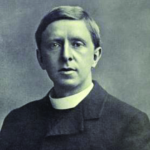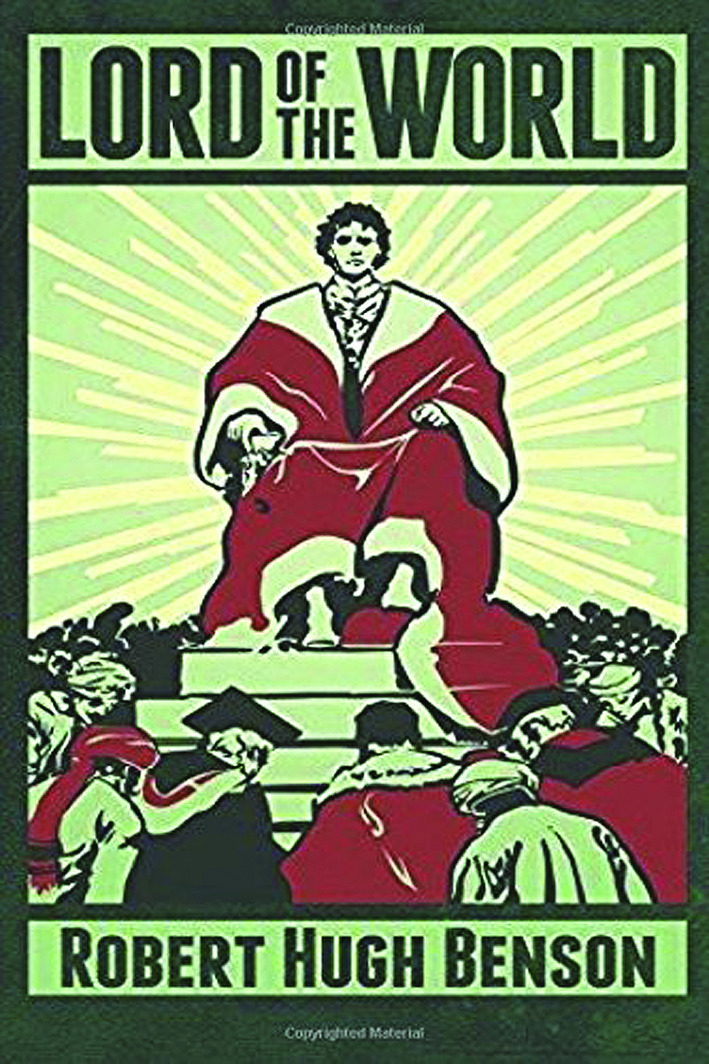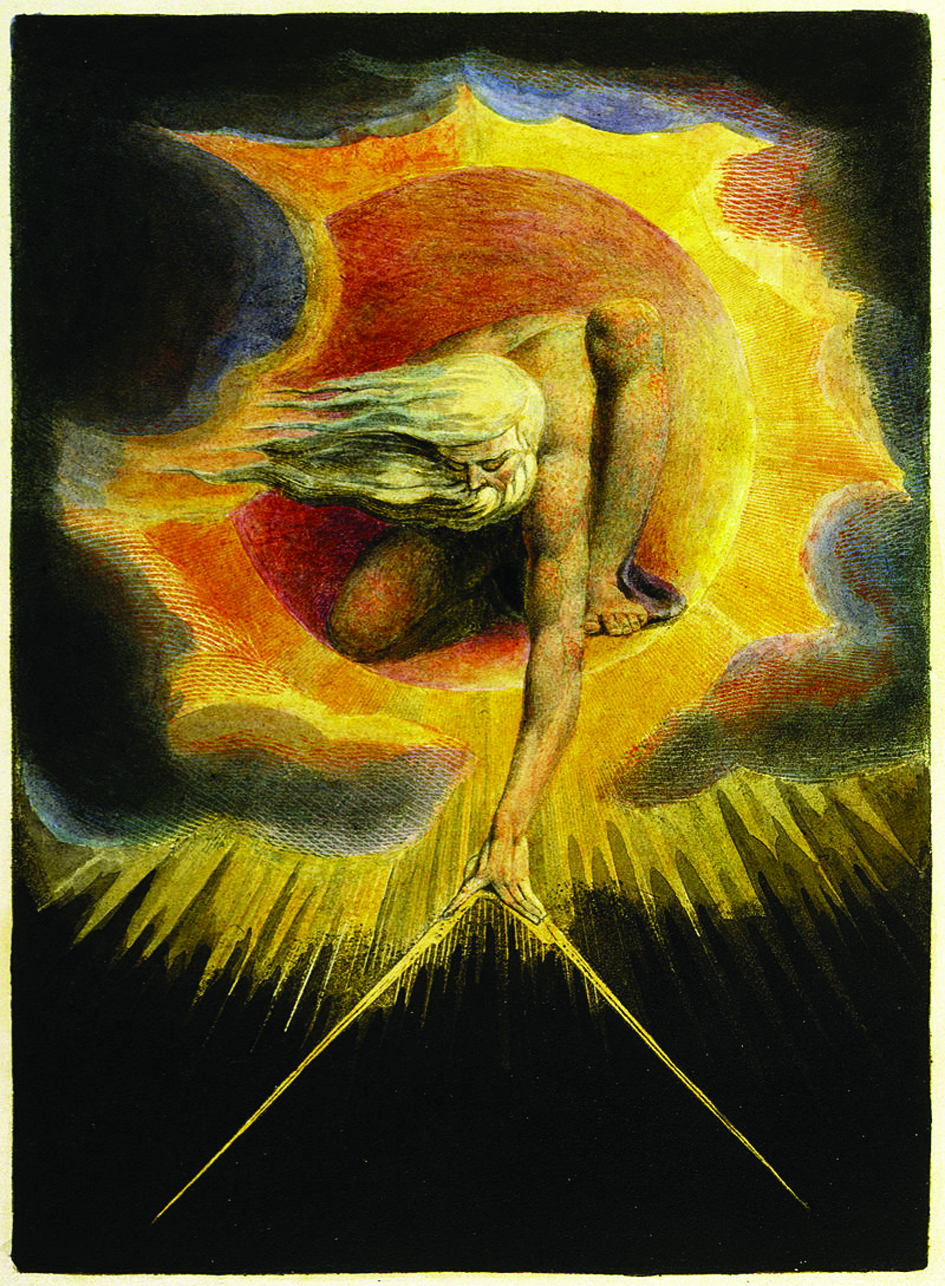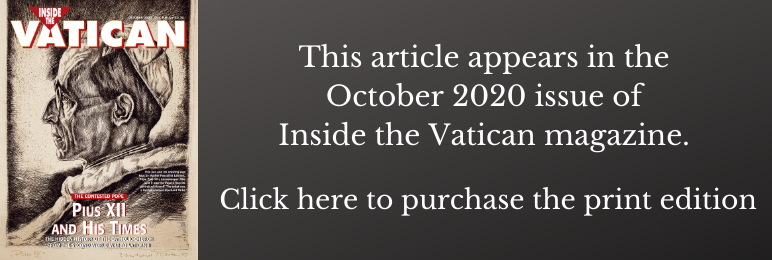More than a century ago, Monsignor Robert Hugh Benson foresaw the rise of secular humanism, the contraction of the Catholic Church, and the coming of the Antichrist…
By ITV Staff
 Editor’s Note: The passage below is from the novel Lord of the World, written by the English Catholic convert Monsignor Robert Hugh Benson (the son of the Anglican Archbishop of Canterbury) in 1907. He attempts a vision of the world more than a century in the future — in the early 21st century… our own time… predicting the rise of Communism, the fall of faith in many places, the advance of technology (he foresees helicopters) and so forth, up until… the Second Coming of the Lord, with which his vision ends. For this reason, and also because Pope Benedict and Pope Francis have repeatedly cited Benson’s book, saying its clarification of the danger of a type of humanitarianism without God is a true danger that we do face, we are printing selections from it in ITV, now and in the months ahead.
Editor’s Note: The passage below is from the novel Lord of the World, written by the English Catholic convert Monsignor Robert Hugh Benson (the son of the Anglican Archbishop of Canterbury) in 1907. He attempts a vision of the world more than a century in the future — in the early 21st century… our own time… predicting the rise of Communism, the fall of faith in many places, the advance of technology (he foresees helicopters) and so forth, up until… the Second Coming of the Lord, with which his vision ends. For this reason, and also because Pope Benedict and Pope Francis have repeatedly cited Benson’s book, saying its clarification of the danger of a type of humanitarianism without God is a true danger that we do face, we are printing selections from it in ITV, now and in the months ahead.
LORD OF THE WORLD
 BY ROBERT HUGH BENSON (1907)
BY ROBERT HUGH BENSON (1907)
BOOK II-THE ENCOUNTER
CHAPTER I
I
Oliver Brand was seated at his desk, on the evening of the next day, reading the leading article of the New People, evening edition.
* * * * *
“We have had time,” he read, “to recover ourselves a little from the intoxication of last night. Before embarking on prophecy, it will be as well to recall the facts. Up to yesterday evening our anxiety with regard to the Eastern crisis continued; and when twenty-one o’clock struck there were not more than forty persons in London—the English delegates, that is to say—who knew positively that the danger was over. Between that moment and half-an-hour later the Government took a few discreet steps: a select number of persons were informed; the police were called out, with half-a-dozen regiments, to preserve order; Paul’s House was cleared; the railroad companies were warned; and at the half hour precisely the announcement was made by means of the electric placards in every quarter of London, as well as in all large provincial towns. We have not space now to adequately describe the admirable manner in which the public authorities did their duty; it is enough to say that not more than seventy fatalities took place in the whole of London; nor is it our business to criticise the action of the Government, in choosing this mode of making the announcement.
“By twenty-two o’clock Paul’s House was filled in every corner, the Old Choir was reserved for members of Parliament and public officials, the quarter-dome galleries were filled with ladies, and to the rest of the floor the public was freely admitted. The volor-police also inform us now that for about the distance of one mile in every direction round this centre every thoroughfare was blocked with pedestrians, and, two hours later, as we all know, practically all the main streets of the whole of London were in the same condition.
“It was an excellent choice by which Mr. OLIVER BRAND was selected as the first speaker. His arm was still in bandages; and the appeal of his figure as well as his passionate words struck the first explicit note of the evening. A report of his words will be found in another column. In their turns, the PRIME MINISTER, Mr. SNOWFORD, the FIRST MINISTER OF THE ADMIRALTY, THE SECRETARY FOR EASTERN AFFAIRS, and LORD PEMBERTON, all spoke a few words, corroborating the extraordinary news. At a quarter before twenty-three, the noise of cheering outside announced the arrival of the American delegates from Paris, and one by one these ascended the platform by the south gates of the Old Choir. Each spoke in turn.
It is impossible to appreciate words spoken at such a moment as this; but perhaps it is not invidious to name Mr. MARKHAM as the orator who above all others appealed to those who were privileged to hear him. It was he, too, who told us explicitly what others had merely mentioned, to the effect that the success of the American efforts was entirely due to Mr. JULIAN FELSENBURGH.
As yet Mr. FELSENBURGH had not arrived; but in answer to a roar of inquiry, Mr. MARKHAM announced that this gentleman would be amongst them in a few minutes. He then proceeded to describe to us, so far as was possible in a few sentences, the methods by which Mr. FELSENBURGH had accomplished what is probably the most astonishing task known to history.
It seems from his words that Mr. FELSENBURGH (whose biography, so far as it is known, we give in another column) is probably the greatest orator that the world has ever known—we use these words deliberately. All languages seem the same to him; he delivered speeches during the eight months through which the Eastern Convention lasted, in no less than fifteen tongues. Of his manner in speaking we shall have a few remarks to make presently.
He showed also, Mr. MARKHAM told us, the most astonishing knowledge, not only of human nature, but of every trait under which that divine thing manifests itself. He appeared acquainted with the history, the prejudices, the fears, the hopes, the expectations of all the innumerable sects and castes of the East to whom it was his business to speak. In fact, as Mr. MARKHAM said, he is probably the first perfect product of that new cosmopolitan creation to which the world has laboured throughout its history. In no less than nine places—Damascus, Irkutsk, Constantinople, Calcutta, Benares, Nanking, among them—he was hailed as Messiah by a Mohammedan mob. Finally, in America, where this extraordinary figure has arisen, all speak well of him. He has been guilty of none of those crimes—there is not one that convicts him of sin—those crimes of the Yellow Press, of corruption, of commercial or political bullying which have so stained the past of all those old politicians who made the sister continent what she has become.

God as seen by William Blake as the Architect of the world, in Ancient of Days, held in the British Museum, London
Mr. FELSENBURGH has not even formed a party. He, and not his underlings, have conquered. Those who were present in Paul’s House on this occasion will understand us when we say that the effect of those words was indescribable.
“When Mr. MARKHAM sat down, there was a silence; then, in order to quiet the rising excitement, the organist struck the first chords of the Masonic Hymn; the words were taken up, and presently not only the whole interior of the building rang with it, but outside, too, the people responded, and the city of London for a few moments became indeed a temple of the Lord.
“Now indeed we come to the most difficult part of our task, and it is better to confess at once that anything resembling journalistic descriptiveness must be resolutely laid aside. The greatest things are best told in the simplest words.
“Towards the close of the fourth verse, a figure in a plain dark suit was observed ascending the steps of the platform. For a moment this attracted no attention, but when it was seen that a sudden movement had broken out among the delegates, the singing began to falter; and it ceased altogether as the figure, after a slight inclination to right and left, passed up the further steps that led to the rostrum. Then occurred a curious incident. The organist aloft at first did not seem to understand, and continued playing, but a sound broke out from the crowd resembling a kind of groan, and instantly he ceased. But no cheering followed. Instead a profound silence dominated in an instant the huge throng; this, by some strange magnetism, communicated itself to those without the building, and when Mr. FELSENBURGH uttered his first words, it was in a stillness that was like a living thing. We leave the explanation of this phenomenon to the expert in psychology.
“Of his actual words we have nothing to say. So far as we are aware no reporter made notes at the moment; but the speech, delivered in Esperanto, was a very simple one, and very short. It consisted of a brief announcement of the great fact of Universal Brotherhood, a congratulation to all who were yet alive to witness this consummation of history; and, at the end, an ascription of praise to that Spirit of the World whose incarnation was now accomplished.
“So much we can say; but we can say nothing as to the impression of the personality who stood there. In appearance the man seemed to be about thirty-three years of age, clean-shaven, upright, with white hair and dark eyes and brows; he stood motionless with his hands on the rail, he made but one gesture that drew a kind of sob from the crowd, he spoke these words slowly, distinctly, and in a clear voice; then he stood waiting.
“There was no response but a sigh which sounded in the ears of at least one who heard it as if the whole world drew breath for the first time; and then that strange heart-shaking silence fell again. Many were weeping silently, the lips of thousands moved without a sound, and all faces were turned to that simple figure, as if the hope of every soul were centred there. So, if we may believe it, the eyes of many, centuries ago, were turned on one known now to history as JESUS OF NAZARETH.
“Mr. FELSENBURGH stood so a moment longer, then he turned down the steps, passed across the platform and disappeared.
“Of what took place outside we have received the following account from an eye-witness. The white volor, so well known now to all who were in London that night, had remained stationary outside the little south door of the Old Choir aisle, poised about twenty feet above the ground. Gradually it became known to the crowd, in those few minutes, who it was who had arrived in it, and upon Mr. FELSENBURGH’S reappearance that same strange groan sounded through the whole length of Paul’s Churchyard, followed by the same silence. The volor descended; the master stepped on board, and once more the vessel rose to a height of twenty feet. It was thought at first that some speech would be made, but none was necessary; and after a moment’s pause, the volor began that wonderful parade which London will never forget. Four times during the night Mr. FELSENBURGH went round the enormous metropolis, speaking no word; and everywhere the groan preceded and followed him, while silence accompanied his actual passage. Two hours after sunrise the white ship rose over Hampstead and disappeared towards the North; and since then he, whom we call, in truth, the Saviour of the world, has not been seen.
“And now what remains to be said?
“Comment is useless. It is enough to say in one short sentence that the new era has begun, to which prophets and kings, and the suffering, the dying, all who labour and are heavy-laden, have aspired in vain. Not only has intercontinental rivalry ceased to exist, but the strife of home dissensions has ceased also. Of him who has been the herald of its inauguration we have nothing more to say. Time alone can show what is yet left for him to do.
“But what has been done is as follows. The Eastern peril has been for ever dissipated. It is understood now, by fanatic barbarians as well as by civilised nations, that the reign of War is ended. ‘Not peace but a sword,’ said CHRIST; and bitterly true have those words proved to be. ‘Not a sword but peace’ is the retort, articulate at last, from those who have renounced CHRIST’S claims or have never accepted them. The principle of love and union learned however falteringly in the West during the last century, has been taken up in the East as well. There shall be no more an appeal to arms, but to justice; no longer a crying after a God Who hides Himself, but to Man who has learned his own Divinity. The Supernatural is dead; rather, we know now that it never yet has been alive.
(End, 1st part, Book II, The Encounter. To be continued)







Facebook Comments